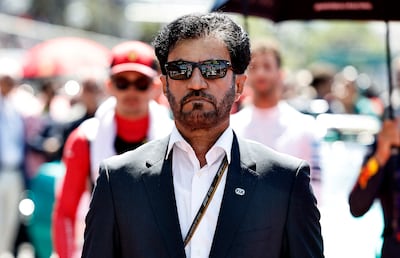One year on and the ghosts of Abu Dhabi 2021 still haunt Formula One ahead of the final race of the season.
Time has not dulled many of the passions that ran rampant through one of the most controversial episodes in the sport’s colourful history.
Max Verstappen took the title from Lewis Hamilton’s grasp after race director Michael Masi allowed only five drivers to un-lap themselves in the closing stages of the season finale.
The fallout has certainly been pervasive, from the dismissal of Masi, the key race official that day, to Mercedes driver Hamilton, the sport’s biggest star, admitting he considered retirement and even that it led to the rewriting of key elements of the racing rule book.
Maybe they even powered the wind of change that saw Abu Dhabi’s Mohammed ben Sulayem voted into power as president of the FIA, motor sport's ruling body, just five days later.
Whichever side of the argument you are on, AD21 may have been television gold but it was a huge own goal for F1.
Critics worldwide compared it to doping and race fixing. Fans were, and some still are, furious. When governance fails what is left?
So where does the sport sit a year down the road? Well, it’s a bit of a mixed bag.
One of the first major decisions seemed eminently sensible but proved unworkable. Dividing the sport’s toughest job between two people became a case of "too many cooks".
Masi’s replacements, Eduardo Freitas and Niels Wittich, failed to achieve the consistency drivers ached for.
If you were fined for an infraction one weekend it should be the same a race, or a year, later. If an action was allowed today it is allowed always. But in reality it proved elusive.
The season’s simmering discontent came to a head in Japan, in October. In a massive FIA blunder, drivers were sent on the track in blinding spray in exactly the conditions that had led to Jules Bianchi's death eight years before. Had the FIA learnt nothing?
It was without doubt a far more heinous crime than any committed in Abu Dhabi. After a review the race director on the day, Freitas, was quietly sidelined and Wittich given sole charge, backed by F1 veteran and all-round wise owl Herbie Blash in one of the best moves of the entire year.
A VAR-style video system was set up to help with decision-making.
One of the FIA’s first wins had been a battle of wills with drivers over banning jewellery in the cockpit.

Seemingly minor it was a fundamental safety issue which Ben Sulayem, to his credit, refused to drop when faced with an uproar from petulant pilots.
But the biggest test of his presidency came when Red Bull were found to have broken the sport’s cost-cap rules. After the FIA’s initial prevarication, its $7 million fine and 10 per cent loss of development time hit just the right note.
Even so, last year’s events at Yas Marina Circuit clearly remain an open wound for some. Mercedes boss Toto Wolff, usually the most reasonable of men, launched a distasteful attack on Masi: “Human error or error human. I haven't spoken to him and I don't want to speak to him ever again.”
His call weeks later for “open-mindedness” rang a little hollow.
Even Hamilton, who lost out on a record eighth title that day, was more conciliatory.
“It was just bad decision-making. I’m sure there is ego involved and then there are also the moving parts. There’s people speaking into his ear. I don’t feel like it was particularly targeted.”
But there does continue to be a fundamental weakness in a beleaguered and under-manned FIA system.
Following confusion over the allocation of points in the wet race in Japan which initially turned Verstappen’s championship victory into a farce, the FIA they were at fault.
Meanwhile, the FIA continues to find it difficult to strike the right balance between fairness and over regulation.
Ben Sulayem acknowledged as much on Tuesday with the unveiling of RDDP, a system of rolling review of race incidents and decisions to improve both the process, the decisions and the people who make them.
Having started his presidency at logger heads with it’s primary force, Mercedes, Ben Sulayem will no doubt be pleased to hear this from Wolff: “There is the eagerness to learn and analyse it. What I take as a positive is the strong governance.”
So, after one of the most turbulent years of recent times relative calm has been restored, well mostly, so Ben Sulayem and the FIA get an A minus. Good work, but could do better.



































